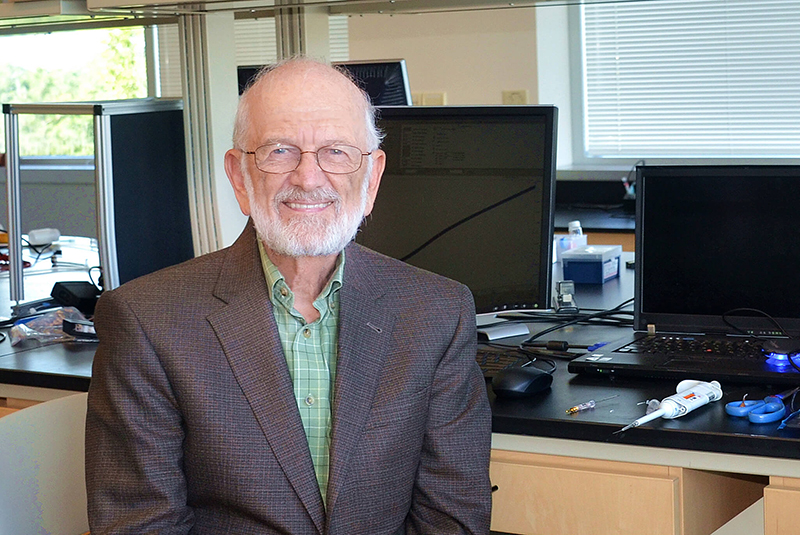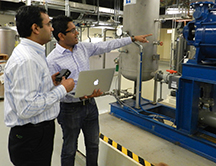October 22, 2018
International companies take notice of Purdue startups: nine now acquired for strength of technology, business potential
Startups based on Purdue University innovations are garnering national, international investment and acquisition opportunities.
WEST LAFAYETTE, Ind. – When Endocyte inked a $2.1 billion acquisition deal Thursday (Oct. 18) to be purchased by Swiss pharmaceutical giant Novartis AG, it became the ninth Purdue University startup to be bought by a major national or international company. Many other Purdue startups have had license and sublicense agreements with established corporations.
 R. Graham Cooks, the Henry B. Hass Distinguished Professor, co-founded Griffin Analytics and Prosolia Inc., two of the nine Purdue startups that were acquired by international companies. Cooks holds more than 100 patents and is a member of the National Academy of Sciences. (Purdue University photo)
Download image
R. Graham Cooks, the Henry B. Hass Distinguished Professor, co-founded Griffin Analytics and Prosolia Inc., two of the nine Purdue startups that were acquired by international companies. Cooks holds more than 100 patents and is a member of the National Academy of Sciences. (Purdue University photo)
Download image
With the acquired companies and an additional 200-plus other startups that have brought more than $340 million in funding and investments, Purdue’s innovation pipeline remains strong in developing innovations that solve problems, create jobs and help people. In the past five years, Purdue has averaged 24 startups annually based on Purdue patented innovations. Another 15 startups are generated from Purdue students and others with company-owned intellectual property.
Endocyte Inc. (NASDAQ: ECYT), a biopharmaceutical company with about 70 employees, owns licenses to several Purdue technologies and is moving promising cancer drug platforms through various clinical trials and pre-clinical work. Philip Low, the Purdue University Presidential Scholar in Drug Discovery and the Ralph C. Corley Distinguished Professor of Chemistry, co-founded Endocyte and the company has licensed several of Low’s patented cancer treatment technologies. A YouTube video is available.
“Considering the size and scope of the sale, the acquisition of Endocyte is a landmark moment, but given the explosion in entrepreneurship and new startups at Purdue, it joins a strong list with many more to come,” Purdue University President Mitch Daniels said. “We are so deeply proud of our Purdue scientists whose genius is saving lives from cancer, and now has brought great new wealth to Indiana.”
The Purdue technologies developed and commercialized aligns with Purdue's Giant Leaps campaign, celebrating the university’s global advancements made in health, longevity and quality of life as part of Purdue’s 150th anniversary. This is one of the four themes of the yearlong celebration’s Ideas Festival, designed to showcase Purdue as an intellectual center solving real-world issues.
The companies acquired all started as research projects at Purdue for which a researcher and graduate research assistants elected to create a startup to advance the research. Other Purdue companies acquired by major corporations include:
 Lokesh Gupta, from left, and Anurag Garg founded DATTUS while doctoral students at Purdue University. Plex Systems acquired the company in July.
(Purdue Research Foundation photo)
Download image
Lokesh Gupta, from left, and Anurag Garg founded DATTUS while doctoral students at Purdue University. Plex Systems acquired the company in July.
(Purdue Research Foundation photo)
Download image
• Arxan Defense Systems, a cybersecurity and application security company, sold to Microsemi Corp. in 2010 for an undisclosed amount. In 2018, Microsemi was purchased by Microchip Technology for more than $10 billion. Arxan’s primary technology was developed by Mikhail Atallah, a Purdue distinguished professor of computer science and co-founder of Arxan.
• BASi Bioanalytical Systems Inc., a medical contract research services company, went public in 1997, creating a liquidity event for its existing shareholders. The company joined operations with Seventh Wave Laboratories LLC in July. Pete Kissinger, Purdue professor of analytical chemistry, founded BASi.
• DATTUS Inc., a leader in industrial Internet of Things, launched by Anurag Garg and Lokesh Gupta, a pair of Purdue electrical and computer engineering doctoral students, was sold for an undisclosed price in July to Plex Systems, based in Troy, Michigan.
• Griffin Analytics, a mass spectrometry company, merged with ICx Technologies in 2006 and was later purchased as part of a package by FLIR Systems Inc. in 2010 for about $274 million. Dennis Barkett, a graduate student at Purdue under R. Graham Cooks, the Henry B. Hass Distinguished Professor, co-founded the company with Cooks.
• Prosolia Inc. and Purdue Research Foundation in July sold exclusive rights to desorption electrospray ionization, or DESI, technology for all mass spectrometry applications for $30 million to Waters Corp., based in Milford, Massachusetts. Prosolia was established in 2003 to commercialize another technology from the laboratory of Cooks.
• Spensa Technologies, a digital ag technology company, was sold for an undisclosed amount in March to DTN, a global insights and analysis company based in Minneapolis. Spensa was founded in 2009 by Johnny Park, a research assistant professor of electrical and computer engineering at Purdue.
• PGC, Purdue GMC Center LLC a producer of non-sterile pharmaceutical products, was acquired in 2016 by Alan Chao, a Purdue alumnus and founder of Watson Pharmaceuticals.
• SSCI Inc., a pharmaceutical product development company, was acquired by Aptuit Inc. in 2006 for an undisclosed amount. In 2015, AMRI acquired Aptuit for $60 million. SSCI was co-founded by Steve Byrn, the Charles B. Jordan Professor of Medicinal Chemistry in the College of Pharmacy, and his wife, Sally Byrn.
Brooke Beier, Purdue Office of Technology Commercialization vice president, said the common themes among the startups is they all had strong intellectual properties with dedicated teams that were persistent.
“We are very fortunate to have a strong and constant pipeline of new innovations and a steady number of faculty and researchers who believe in the practical application of their inventions and want to move them to the public,” Beier said. “They are the ones who did the gritty work and persevered through the challenges and pushed the technologies across the finish line.”
The Purdue Office of Technology Commercialization operates one of the most comprehensive technology transfer programs among leading research universities in the United States.
“Purdue’s startup ecosystem has been strong for more than two decades and went into hyper drive in 2013 with several important administrative and policy changes that created an even stronger support system for Purdue entrepreneurs and seed stage financial support to get technologies to the market faster,” said John Hanak, managing director of Purdue Ventures. “What we are now seeing is market validation that the Purdue ecosystem is vibrant and is spinning up significant societal and economic value.”
The Purdue Foundry is an entrepreneurship and commercialization accelerator in the Burton D. Morgan Center for Entrepreneurship in Purdue's Discovery Park whose professionals help Purdue innovators create startups.
Writer: Cynthia Sequin, 765-588-3340, casequin@prf.org
Sources: Mitch Daniels, president@purdue.edu
Brooke Beier, 765-588-3464, BLBeier@prf.org
John Hanak, 765-588-5255, JMHanak@prf.org

